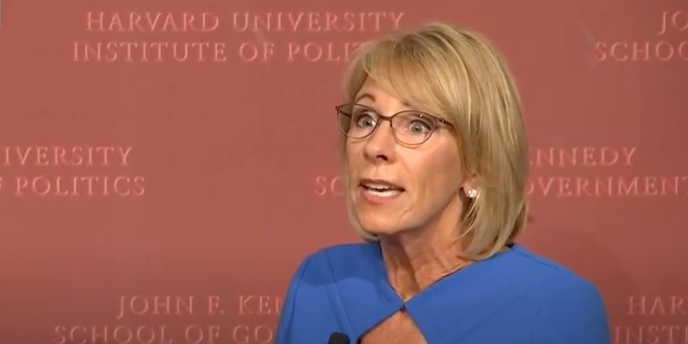(Associated Press) The Trump administration is moving forward with a policy that expands protections for religious groups on college campuses and threatens to cut federal education funding to colleges that violate free speech rules.
The rule was issued by the Education Department Wednesday, less than two months before the election, and cements much of what President Donald Trump outlined in a March 2019 executive order demanding wider speech protections at U.S. colleges. In taking up the issue, Trump highlighted concerns from conservatives who complained that their voices had been suppressed on university campuses.
As part of the policy, the Education Department can suspend or terminate grants to public universities found in court to have violated the First Amendment. In extreme cases, schools could become ineligible for any further grants. The same actions could be taken against private universities found in court to have violated their own speech codes.
Public universities could also lose funding if they fail to provide religious student groups the same rights and benefits as other campus groups, including the use of campus facilities and access to student fee funding. That edict does not apply to private colleges, which have more flexibility in limiting speech on their campuses.
Education Secretary Betsy DeVos said the new rule protects the rights of students, teachers and faith-based institutions.
“Students should not be forced to choose between their faith and their education, and an institution controlled by a religious organization should not have to sacrifice its religious beliefs to participate in Department grants and programs,” DeVos said in a statement.
In his March 2019 executive order, Trump directed a dozen federal agencies to tie their university funding to free speech rules. The new policy applies only to certain Education Department grants, however, and does not cover much larger pools of research funding. It was not immediately clear if similar policies are being prepared by other agencies.
The policy was welcomed by a variety of religious groups that say colleges too often discriminate against students based on their faith. Some groups cited a 2018 case at the University of Iowa, which disbanded several religious groups that declined to adopt a policy forbidding discrimination based on, among other classifications, sexual orientation or preference.
The university launched its crackdown after a gay student was rejected from a leadership position in a campus Christian group.
In its policy, the Education Department specifically forbids colleges from discriminating against religious student groups based on “leadership standards” that are “informed by sincerely held religious beliefs.”
Greg Jao, a spokesman for the evangelical Christian group InterVarsity Fellowship, said the rule is needed to protect student groups that want leaders who agree with their religious beliefs.
“Universities should welcome all religious groups equally, in order to encourage tolerance, pluralism and religious diversity,” he said in a statement.
The policy benefits Muslim student groups by allowing them to choose their own leaders according to their faith’s principles, said Ismail Royer, director of the Islam and Religious Freedom Action Team for the Religious Freedom Institute.
“This right should be reserved for all student religious organizations, and not usurped by university officials based on their own shifting, unpredictable standards,” Royer said in a statement.
Many universities, however, see it as an unnecessary intrusion. They say the penalties are too severe and that it would be too easy to trigger a loss of funding. The American Council on Education, a group of college presidents, previously said the policy would lead to “a flood of frivolous lawsuits.”
Terry Hartle, the group’s senior vice president, called it a political move designed to energize Trump’s Christian supporters.
“We see this as a politically motivated solution in search of a problem, being issued in an election year,” he said. “This is being done to appeal to a particular part of the president’s base.”
When Trump initially proposed his executive order last year, he highlighted the case of an activist who was punched while recruiting for the conservative group Turning Point USA at the University of California, Berkeley. Trump revived the topic in July when he threatened to withdraw tax-exempt status for schools and universities.
In issuing his threat on Twitter, Trump said “Too many Universities and School Systems are about Radical Left Indoctrination, not Education.”

